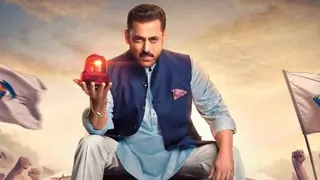Balika Vadhu started out as an experiment but has now become the most strikingly successful show on television. Love it or hate it, you certainly cannot miss it. It's a phenomenon just like Kyunki... Such a success streak is no doubt a noteworthy achievement. Add to that Balika Vadhu deals with a sensitive issue like child-marriage on national television. So the question arises — is it able to carry off its social responsibility to educate and not just entertain?
"Frankly, we in the team believe that it is not possible to educate people until you catch their fancy," says well-known writer Gajra Kottary who co-writes Balika Vadhu and pens the story of every episode. "Unless the audience wants to listen, you cannot tell them because the remote is in their hand. So the point is to be able to drive your message across in a very entertaining manner. As far as our stand is concerned, we make it very clear right in the beginning of the serial and at its end (there is a written disclaimer condemning child marriages) — we are not trying to hype up or use the regressive theme, as some people have called it, to entertain people."
But is it easy to strike the balance between watchability and a social message? The serial constantly focuses on the sufferings of an 11-year-old girl-bride, Anandi (played by Avika Gor) at the hands of her dadisa, her grandmother-in-law (Surekha Sikri).
The current track deals with yet another child-marriage in the family — a 15 year-old girl is married to a man twice her age. And he is even shown to abuse her physically. Does a one-line disclaimer at the beginning and end of the show take care of all the sufferings shown? Gajra says: "We are not promoting child-marriage at all. The theme of Balika Vadhu is the story of a robbed childhood. A girl who was very bright was not allowed to continue her studies and has to come to terms with growing up when there is so much for her to explore and discover."
Gajra points out that the serial's anti-child-marriage stance is clear enough and it has had a positive influence. She says, "I know of many cases, especially in Rajasthan and UP, where parents among the poorer classes were on the verge of marrying off their 15-16 year old daughters but after watching the serial have said 'Let's wait a bit'. That is what an achievement is all about."
That's definitely commendable. But wouldn't the serial's message have been even more impactful if there were stronger voices raised against the wrong-doing? Or if there was a strong adult voice of reason which is not easily squashed? Gajra argues: "It is not a documentary and neither is it a film where you have to prove certain points within three hours. It is about portraying reality, which in this case is extremely morbid, unfair and unjust. The reality is that people like Anandi's parents are not able to put their foot down in the face of the social order. It takes a long time."
Taking a breath, Gajra adds: "We have a lot of story to go. We are certainly not going to have our protagonist just go on (being victimised) like this. She is going to be a real fighter because she has been the victim," concludes Gajra.
Source : The Calcutta Telegraph


















